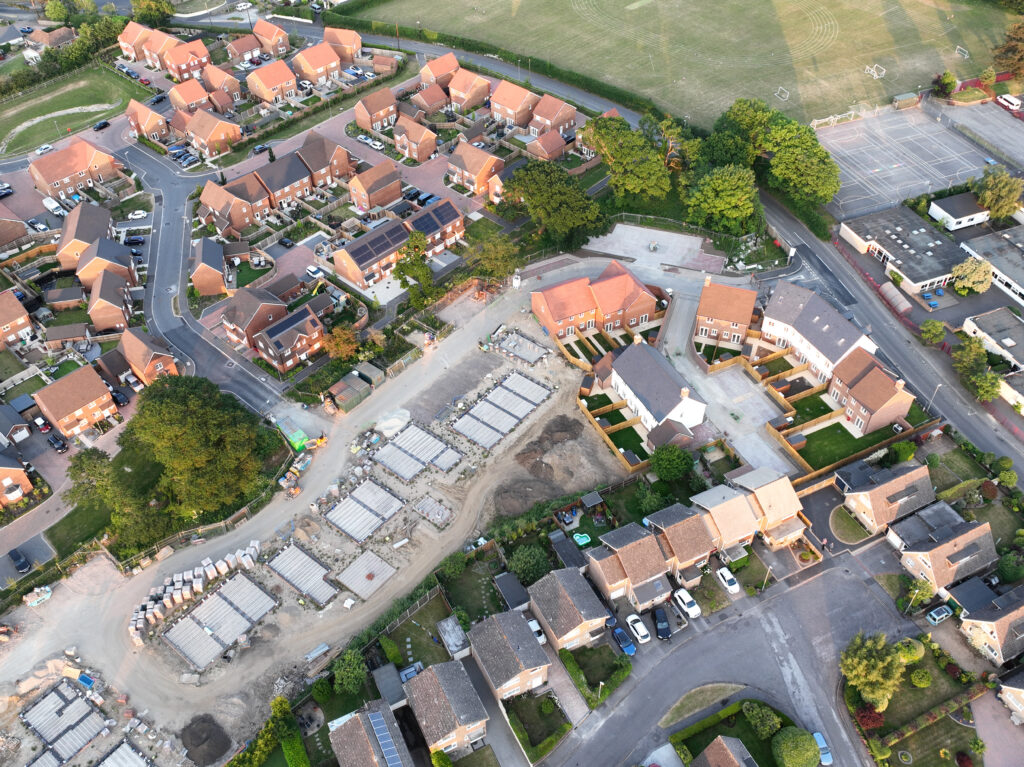Enfranchisement Lawyers
Herrington Carmichael has one of largest property law teams in the South-East of England. Supporting our clients across a range of specialist legal services.
Collective Enfranchisement
Our team of specialist property solicitors regularly work alongside groups of tenants to provide comprehensive expert advice and support with collective and leasehold enfranchisements.
We can help you to quickly establish whether you qualify for collective enfranchisement and guide you through the entire process swiftly and cost-effectively – whether you are looking to initiate the purchase of the freehold of your block of apartments yourselves, or whether you have been served with a Section 5 ‘Right of First Refusal’ Notice by your landlord and are wondering what to do next.
Having worked on a wide range of projects of varying size and value (including an enfranchisement of a block of 115 flats in Whitechapel, London) we can offer excellent customer service, pragmatic and straightforward advice, together with competitive fees when compared with many of the larger City firms.

Collective Enfranchisement
Buying the freehold of your block of flats can be a great idea for a number of reasons – it can give you control over the management of your building, prevent future development, allow you to abolish ground rents and to set your own service charges, lets you cheaply extend the term of your leases (or change any other terms that are unfavourable) as well as many other benefits.
If a number of leaseholders within a block of flats have “short” leases (i.e. with 80 years or so left on their lease) they may find it more cost-effective to buy the freehold collectively rather than each of them seeking a separate lease extension with the freeholder.
However, there is a strict legal process that has to be followed in order to achieve this aim – and not all groups of tenants qualify to be able to do so in the first place. It is therefore essential to seek specialist legal advice from solicitors who understand the process from the outset. This will help the process run smoothly and increase your chance of a successful outcome.
At Herrington Carmichael, we are highly experienced in guiding groups of leaseholders through the collective enfranchisement process from the start. We can advise you on your rights, whether you qualify for collective enfranchisement, and the easiest and quickest ways forward to collaborate with your fellow leaseholders (from both a legal and practical perspective).
We can advise you on the different ways in which the freehold can be purchased (as a group of individuals, a trust, or – more commonly – a company set up specifically for the purposes of holding the freehold. Our Corporate team are experienced in setting up exactly such companies for our collective enfranchisement clients.
We can also advise you on what happens once you have acquired the freehold, including issues such as how the building will be managed, setting service charges and other fees, and dealing with lease renewals and changes.
As one of the leading specialist teams in Collective Enfranchisement in the UK, we can offer the exceptional legal expertise and close personal service you need for a successful collective enfranchisement.
Lease Extensions
At Herrington Carmichael we have a specialist team of lease extension solicitors who can guide you through the process – whether you are a landlord, or a tenant. This is a niche area of property law and mistakes can happen if the correct procedures are not followed, and so it is essential to have trusted lawyers to assist you each step of the way.
As a residential tenant, in certain circumstances you can legally apply to your landlord for a statutory Lease Extension. You need to have what is known as a ‘long lease’ (a lease which is originally granted for more than 21 years) and also to have owned the property for at least 2 years. The claim is made under Section 42 of the Leasehold Reform Housing and Urban Development Act 1993.
This may be a great option for you if it is impractical to get all the other tenants in your building to join with you in buying the freehold via collective enfranchisement, or if the cost of purchasing your freehold is more than you can afford.
A statutory Lease Extension adds 90 years to the term of your lease and can reduce or abolish ground rent, in exchange for a one-off payment to your landlord. This can be vital in situations where the remaining term of your lease is dropping to around 80 years or less, as it can become more and more difficult to sell your lease or get a mortgage in this situation. Financially, it can often make sense to apply to extend your lease sooner rather than later – the longer you have left to run on your existing lease term, the lower the premium payable to extend will be.
Right of First Refusal
When a landlord is planning to sell the freehold of a building that contains residential flats -whether by ‘normal’ sale or by auction – it must first (before entering into a contract with the buyer) give the flatowners (‘leaseholders’) an opportunity to purchase the building on the same terms as the proposed sale. This is a legal obligation on the landlord under the Landlord and Tenant Act 1987 – they must serve a notice on each of the leaseholders setting out the terms of the proposed sale and offering them a Right of First Refusal. The leaseholders then have a set period of time in which to take up this offer.
Failure of the landlord to serve these notices in the correct way (and containing specific information) or to comply with the Act is a criminal offence and so obviously if you are a landlord in this situation and contemplating a sale of your building it is crucial that you take prompt advice on this area of law to ensure you comply with your legal obligations.
Similarly, if you are a tenant who has been served with a Section 5 Notice / Right of First Refusal Notice, then it is vital that you instruct a solicitor with experience in this field to help you respond to the Notice within the set timescales – if you fail to serve a counter notice in time and in the correct manner then you will lose your legal right to purchase the freehold and the Landlord will be free to sell on to the third party.
We work closely with specialist valuers who can assist you in ascertaining whether the price at which the freehold is being offered represents good value or not.
If you embark on the process (whether landlord or tenant) there are a number of further timetables and statutory deadlines dealing with the drafting and preparation of the documents right through to completion of the sale of the freehold. If either side does not comply with these deadlines it can have serious implications for their ability to proceed with the project, and so again this is where Herrington Carmichael can steer you through this complex process as quickly and smoothly as possible.
Right to Manage
The right to manage was introduced by the Commonhold and Leasehold Reform Act 2002 as an alternative for tenants to purchasing their freehold. It gives the leaseholders the right to form a company to take over the management functions of the landlord without needing to buy the freehold.
The advantage of this can be that tenants can gain autonomy over the running of their building but without the expense of purchasing the freehold. They can appoint their own independent managing agents which can be an attractive option where tenants are distrusting of any existing management company engaged by the freeholder. It’s important to note that it also does not prohibit the tenants from acquiring the freehold at a later date, should they wish to.
Herrington Carmichael can assist you with every step in the process – including setting up a special right to manage (RTM) company and then issuing notices inviting participation to all flat owners who are not members of the company. Once 14 days have passed from the date of the notices inviting participation (and as long as 50 per cent or more of the tenants agree to be a part of the RTM) then a formal claim notice is served on the landlord.
The process then follows a statutory timetable of actions which we can guide you through. The process for an unchallenged RTM claim takes about four months to complete.
Our team of specialist property law solicitors are highly experienced in this niche area of law and can offer great service at a competitive price, set out for you at the very start of the transaction.
Collective Enfranchisement
Buying the freehold of your block of flats can be a great idea for a number of reasons – it can give you control over the management of your building, prevent future development, allow you to abolish ground rents and to set your own service charges, lets you cheaply extend the term of your leases (or change any other terms that are unfavourable) as well as many other benefits.
If a number of leaseholders within a block of flats have “short” leases (i.e. with 80 years or so left on their lease) they may find it more cost-effective to buy the freehold collectively rather than each of them seeking a separate lease extension with the freeholder.
However, there is a strict legal process that has to be followed in order to achieve this aim – and not all groups of tenants qualify to be able to do so in the first place. It is therefore essential to seek specialist legal advice from solicitors who understand the process from the outset. This will help the process run smoothly and increase your chance of a successful outcome.
At Herrington Carmichael, we are highly experienced in guiding groups of leaseholders through the collective enfranchisement process from the start. We can advise you on your rights, whether you qualify for collective enfranchisement, and the easiest and quickest ways forward to collaborate with your fellow leaseholders (from both a legal and practical perspective).
We can advise you on the different ways in which the freehold can be purchased (as a group of individuals, a trust, or – more commonly – a company set up specifically for the purposes of holding the freehold. Our Corporate team are experienced in setting up exactly such companies for our collective enfranchisement clients.
We can also advise you on what happens once you have acquired the freehold, including issues such as how the building will be managed, setting service charges and other fees, and dealing with lease renewals and changes.
As one of the leading specialist teams in Collective Enfranchisement in the UK, we can offer the exceptional legal expertise and close personal service you need for a successful collective enfranchisement.
Lease Extensions
At Herrington Carmichael we have a specialist team of lease extension solicitors who can guide you through the process – whether you are a landlord, or a tenant. This is a niche area of property law and mistakes can happen if the correct procedures are not followed, and so it is essential to have trusted lawyers to assist you each step of the way.
As a residential tenant, in certain circumstances you can legally apply to your landlord for a statutory Lease Extension. You need to have what is known as a ‘long lease’ (a lease which is originally granted for more than 21 years) and also to have owned the property for at least 2 years. The claim is made under Section 42 of the Leasehold Reform Housing and Urban Development Act 1993.
This may be a great option for you if it is impractical to get all the other tenants in your building to join with you in buying the freehold via collective enfranchisement, or if the cost of purchasing your freehold is more than you can afford.
A statutory Lease Extension adds 90 years to the term of your lease and can reduce or abolish ground rent, in exchange for a one-off payment to your landlord. This can be vital in situations where the remaining term of your lease is dropping to around 80 years or less, as it can become more and more difficult to sell your lease or get a mortgage in this situation. Financially, it can often make sense to apply to extend your lease sooner rather than later – the longer you have left to run on your existing lease term, the lower the premium payable to extend will be.
Right of First Refusal
When a landlord is planning to sell the freehold of a building that contains residential flats -whether by ‘normal’ sale or by auction – it must first (before entering into a contract with the buyer) give the flatowners (‘leaseholders’) an opportunity to purchase the building on the same terms as the proposed sale. This is a legal obligation on the landlord under the Landlord and Tenant Act 1987 – they must serve a notice on each of the leaseholders setting out the terms of the proposed sale and offering them a Right of First Refusal. The leaseholders then have a set period of time in which to take up this offer.
Failure of the landlord to serve these notices in the correct way (and containing specific information) or to comply with the Act is a criminal offence and so obviously if you are a landlord in this situation and contemplating a sale of your building it is crucial that you take prompt advice on this area of law to ensure you comply with your legal obligations.
Similarly, if you are a tenant who has been served with a Section 5 Notice / Right of First Refusal Notice, then it is vital that you instruct a solicitor with experience in this field to help you respond to the Notice within the set timescales – if you fail to serve a counter notice in time and in the correct manner then you will lose your legal right to purchase the freehold and the Landlord will be free to sell on to the third party.
We work closely with specialist valuers who can assist you in ascertaining whether the price at which the freehold is being offered represents good value or not.
If you embark on the process (whether landlord or tenant) there are a number of further timetables and statutory deadlines dealing with the drafting and preparation of the documents right through to completion of the sale of the freehold. If either side does not comply with these deadlines it can have serious implications for their ability to proceed with the project, and so again this is where Herrington Carmichael can steer you through this complex process as quickly and smoothly as possible.
Right to Manage
The right to manage was introduced by the Commonhold and Leasehold Reform Act 2002 as an alternative for tenants to purchasing their freehold. It gives the leaseholders the right to form a company to take over the management functions of the landlord without needing to buy the freehold.
The advantage of this can be that tenants can gain autonomy over the running of their building but without the expense of purchasing the freehold. They can appoint their own independent managing agents which can be an attractive option where tenants are distrusting of any existing management company engaged by the freeholder. It’s important to note that it also does not prohibit the tenants from acquiring the freehold at a later date, should they wish to.
Herrington Carmichael can assist you with every step in the process – including setting up a special right to manage (RTM) company and then issuing notices inviting participation to all flat owners who are not members of the company. Once 14 days have passed from the date of the notices inviting participation (and as long as 50 per cent or more of the tenants agree to be a part of the RTM) then a formal claim notice is served on the landlord.
The process then follows a statutory timetable of actions which we can guide you through. The process for an unchallenged RTM claim takes about four months to complete.
Our team of specialist property law solicitors are highly experienced in this niche area of law and can offer great service at a competitive price, set out for you at the very start of the transaction.
FAQs
What is Collective Enfranchisement?
Leaseholders collectively have the power to join together to buy the freehold of their building from the freeholder (also referred to as “the landlord”) in certain circumstances under the Leasehold Reform, Housing and Urban Development Act 1993 – this process is known as ‘collective enfranchisement’ or ‘leasehold enfranchisement’. It allows the flat/apartment owners to collectively own the freehold to their building, which gives them the power to take control over how their building is managed and developed and also means that they can extend their leases and abolish ground rent payments.
Can any tenants take part in Collective Enfranchisement?
No, unfortunately it’s not quite that simple! To be eligible for collective enfranchisement there are certain criteria and conditions which need to be met, both in terms of your building and also in relation to who is a ‘qualifying tenant’ and able to take part. In addition there legally has to be a minimum number of participants. Herrington Carmichael can give you quick and easy advice from the outset on navigating these tricky areas of law.
How do I Exercise my Right to Collective Enfranchisement?
Prior to submitting a claim it is worthwhile to take advice from a solicitor and a surveyor. The role of the solicitor is to advise on whether the right of collective enfranchisement will apply, and if so they can represent the participating qualifying leaseholders throughout the claim process. Meanwhile, the surveyor will be able to advise on the premium (i.e. the price that the leaseholders should pay for the freehold) to put in the formal application to the freeholder.
There is a set process for enfranchisement that has been established by law. So, once the initial advice has been taken a formal application can be served on the freeholder. This will state that the collective enfranchisement rights are being exercised, and confirm the price that the leaseholders are willing to pay for the freehold. Following service of this initial notice there is a 2 month period in which the freeholder can serve a counter-notice stating whether they accept the claim, and if so, whether all of the terms in the initial notice (including the price) are agreed. If any terms are not agreed there is a further 2 month period in which the leaseholders and the freeholder can negotiate terms. Where agreement is not reached, there is a further 4 month period in which the freeholder or the leaseholder may apply to the relevant tribunal for them to make a decision on the claim. Negotiations can continue within this time. It is therefore worth taking into account that the process for collective enfranchisement can be a relatively lengthy process.
If agreement cannot be reached, and if the matter is referred to the tribunal, they will make a formal decision on the terms on which any enfranchisement claim should proceed. Following the determination of the tribunal in favour of the enfranchisement both parties should enter into a formal contract for the sale of the freehold and then proceed with the sale and purchase transaction.
When exercising these rights, leaseholders should be aware that they will be responsible for both their own legal and surveyor’s costs as well as the reasonable legal and surveyor’s costs of the freeholder. Should the matter be referred to the tribunal, each party will be responsible for their own costs from that point.
Why might I need a Participation Agreement?
A Participation Agreement is a legally binding contractual document entered into between the participating leaseholders in a collective enfranchisement claim, and is a crucial part of the process – especially in projects with larger numbers of tenants involved. The Agreement sets out how decisions are made between the tenants, and also the financial contributions that need to be made (and at what stage in the process). This gives security and certainty to all the participating leaseholders that their project will not get into difficulties further down the road if anyone chooses to drop out.
Legal Insight
Meet the Team
Related expertise
Best Law Firms 2024
Herrington Carmichael has once again been named in the Times Best Law Firms. We were first listed in 2023 and have once again made the Best Law Firms list for 2024.









